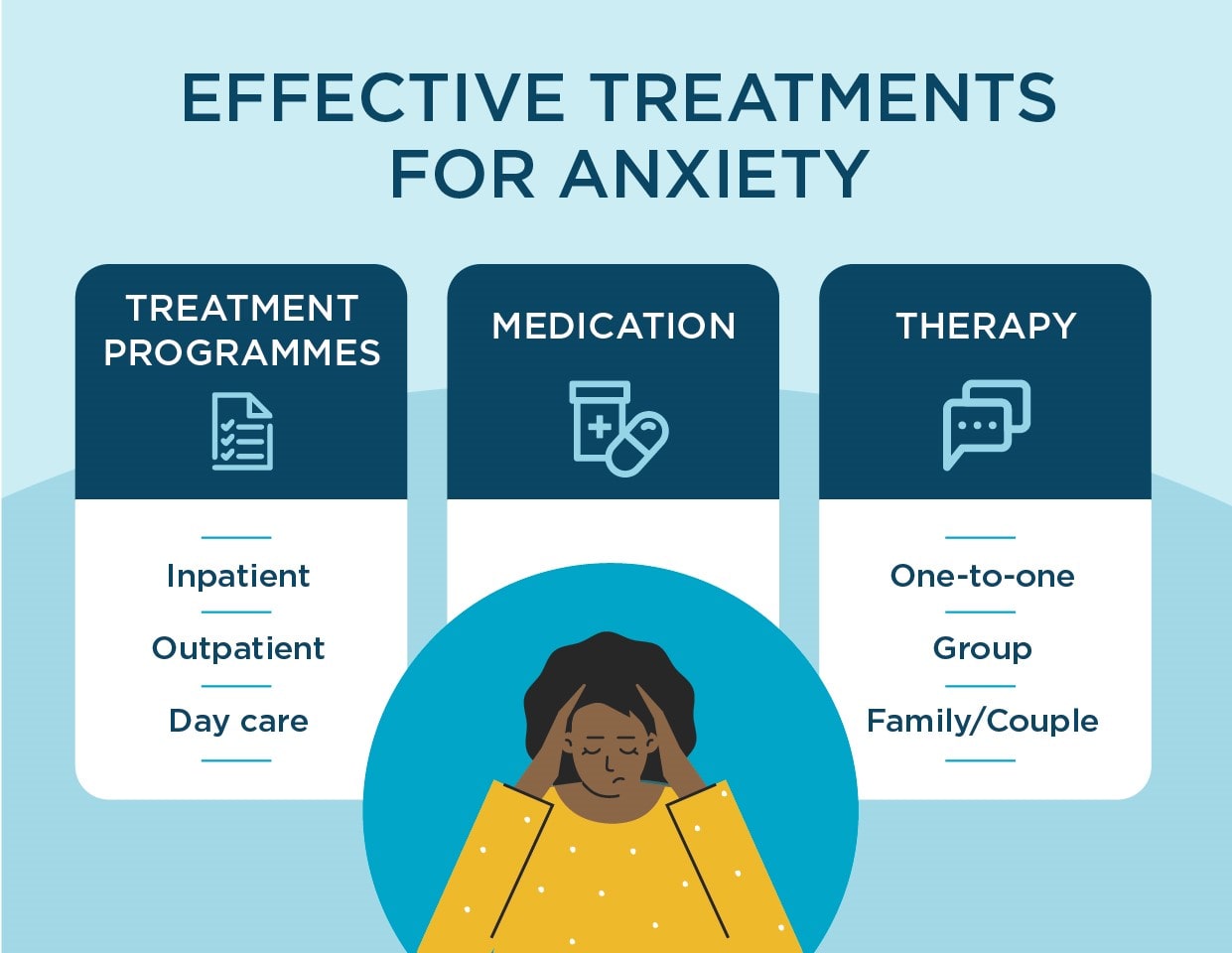Find balance and understanding with trusted counseling services for anxiety
Checking Out Different Strategies in Therapy for Anxiousness Disorder for Enduring Change
When dealing with anxiety conditions, it's necessary to discover a range of counseling methods. Each method provides distinct insights and tools to help you manage your signs successfully. You could locate that incorporating techniques can yield the most effective outcomes. Nevertheless, recognizing the nuances of these techniques is key to promoting long-term adjustment. What happens if the right mix could launch a brand-new degree of psychological wellness for you?
Understanding Anxiety Conditions: A Brief Overview
Stress and anxiety conditions, which influence countless people worldwide, can significantly impact every day life. You might experience overwhelming feelings of worry or fret that seem unmanageable. These sensations can result in physical signs and symptoms like an auto racing heart, sweating, or perhaps wooziness. Common sorts of anxiousness problems consist of generalized anxiousness problem, panic disorder, and social anxiousness condition. Each has special indicators, but they all share a propensity to disrupt your routine and relationships.Understanding the origin creates of your stress and anxiety is crucial. It could stem from genetics, brain chemistry, or life experiences. Recognizing your triggers can assist you handle your feedbacks much better. It is essential to keep in mind that you're not the only one in this struggle. Many individuals encounter similar difficulties, and seeking help is a strong action towards feeling better. By learning concerning stress and anxiety disorders, you're currently on the course to understanding and managing your condition more effectively.
Cognitive-Behavioral Therapy: Testing Negative Idea Patterns
In Cognitive-Behavioral Treatment, you'll start by identifying the adverse thought activates that add to your anxiety. You'll work on replacing them with even more favorable options as soon as you recognize these ideas. With each other, you'll build effective coping approaches to aid handle your anxiety in everyday scenarios.
Recognizing Negative Idea Triggers

When you encounter moments of distress, recognizing the particular triggers behind your unfavorable thoughts can be important in managing anxiety. Beginning by taking note of circumstances that prompt sensations of fear or fear. Is it a jampacked space, a forthcoming due date, or a conversation with particular people? Take down these circumstances in a journal. This will certainly aid you identify patterns in your thinking. Additionally, notice physical feelings that accompany your unfavorable thoughts, like a racing heart or rigidity in your upper body. By determining these triggers, you acquire insight into what's sustaining your anxiety. Comprehending these connections is the very first action in testing those ideas and eventually reclaiming control over your emotional feedbacks.
Replacing Thoughts With Positives
Challenging adverse idea patterns is a necessary action in transforming your mindset and lowering stress and anxiety. You might often locate yourself entraped in cycles of insecurity or catastrophic reasoning. As opposed to letting these thoughts determine your sensations, technique replacing them with practical options or favorable affirmations. When you think, "I can't manage this," move it to, "I can manage challenges one action at a time." This straightforward adjustment can considerably influence your emotion. Frequently recognizing and responding to these negative thoughts helps produce a healthier internal discussion. Remember, it takes time and effort, however constantly exercising this method can lead to long lasting change, equipping you to deal with stress and anxiety with restored confidence and durability.
Structure Coping Techniques With Each Other
Replacing adverse thoughts is just the beginning of taking care of anxiety effectively. To develop enduring modification, you need to build coping methods that equip you. Cognitive-Behavioral Therapy (CBT) aids you determine and test those unhelpful thought patterns. Together, you and your counselor can check out just how these thoughts impact your sensations and behaviors.Start by establishing functional strategies, like journaling or mindfulness exercises, that enable you to confront anxiety head-on. When you encounter your worries slowly, you'll discover to react in a different way.

Mindfulness and Acceptance-Based Approaches: Growing Present-Moment Understanding
As you browse the intricacies of anxiousness, incorporating mindfulness and acceptance-based methods can significantly improve your capability to cultivate present-moment understanding. By focusing on the right here and currently, you'll find that you can observe your ideas and sensations without judgment (Counseling services for anxiety). This method helps you acknowledge your stress and anxiety without really feeling overwhelmed by it.Engaging in mindfulness workouts, such as deep breathing, body scans, or guided meditations, enables you to ground on your own in your current experience. Acceptance-based methods encourage you to welcome your feelings as opposed to combat versus them. When you accept your sensations, they lose their power over you.Incorporating these methods right into your daily routine can change exactly how you react to anxiety. You'll create durability and learn to browse demanding circumstances with greater simplicity. Ultimately, growing present-moment recognition lays the structure for lasting modification, empowering you to lead a more satisfying life
Direct Exposure Therapy: Confronting Concerns Progressively
Exposure therapy helps you confront your worries in a steady means, making it less frustrating. You'll discover techniques to face anxiety-provoking situations detailed, while likewise constructing coping methods to handle your responses. This strategy encourages you to take control and minimize anxiousness in time.
Steady Exposure Strategies

When dealing with anxiousness, slowly confronting your fears can be a powerful method to gain back control. This method, called steady exposure, involves gradually exposing on your own to the situations or things that trigger your anxiousness. Start with much less challenging situations and progressively function your way up to even more challenging ones. For example, if you hesitate of public speaking, you could start by speaking before a mirror, then advance to sharing thoughts with a friend, and ultimately resolve a small group. Each action aids desensitize you to the fear, constructing your confidence in time. Keep in mind, it's necessary to speed yourself and commemorate small success as you move via this procedure, strengthening your capacity to take care of stress and anxiety successfully.
Structure Coping Approaches
Building effective coping techniques is vital for handling stress and anxiety, particularly as you face your fears progressively - Counseling services for anxiety. One powerful technique is exposure therapy, where you begin by encountering your fears in a controlled manner. Begin with much less daunting situations and gradually work your means as much as more tough situations. This gradual exposure aids desensitize you to stress and anxiety activates, making them less overwhelming.Incorporate relaxation techniques, such as deep breathing or mindfulness, to soothe your mind during direct exposure. Track your progress, commemorating little success along the road to boost your confidence. Remember, it's alright to take your time; the objective isn't perfection however stable enhancement. By constructing these strategies, you'll empower on your own to browse anxiousness and welcome life more totally
Psychodynamic Therapy: Revealing Source of Anxiety
Psychodynamic therapy checks out the subconscious mind, exposing the origin of your stress and anxiety. By examining your ideas, feelings, and past experiences, this method helps you uncover underlying problems and unsolved concerns that may add to your present anxiousness. You'll deal with a specialist to investigate childhood years experiences, connections, and psychological patterns that form your reactions today.As you get insight right into these much deeper layers of your psyche, you'll begin to acknowledge just how past occasions influence your existing behavior. This understanding can lead to catharsis, allowing you to refine emotions you might have suppressed.Through the healing relationship, you can also determine defense reaction that might have created with time, providing a more clear course to alter. Ultimately, psychodynamic therapy furnishes you with the devices to resolve your anxiousness at its core, promoting long-term improvement in your psychological wellness.
Integrative and Holistic Approaches: Integrating Strategies for Greater Efficiency
Integrating numerous therapeutic strategies can improve your journey toward handling stress and anxiety more properly. By combining aspects from cognitive-behavioral therapy, mindfulness practices, and all natural methods, you can create an individualized approach that resolves your special requirements. You might utilize cognitive-behavioral methods to test unfavorable idea patterns while integrating mindfulness workouts to ground yourself in the present moment.Additionally, checking out alternative methods such as yoga or meditation can promote relaxation and reduce stress and anxiety signs. This blend allows you to establish higher self-awareness and resilience.Experimenting with these diverse methods can help you discover what resonates most with you. Remember, it's about discovering a synergy that works, instead of adhering to a solitary strategy. This integrative technique not only provides instant alleviation however likewise fosters long-lasting abilities for handling stress and anxiety, equipping you to reclaim control over your life.
The Role of Support Equipments: Building Strength Via Connection
While it might appear that taking care of stress and anxiety is a solitary journey, having a solid support group can play a necessary function in your resilience. Bordering yourself with empathetic buddies, household, or support system produces a secure room where you can freely share your experiences and feelings. You remind yourself that you're not alone in this struggle.These connections offer support and can provide functional coping strategies that have actually functioned for others when you link with others. It's also an opportunity to obtain point of view; pals can assist you see scenarios in a different way, decreasing sensations of isolation.Moreover, emotional assistance fosters a sense of belonging, which can substantially alleviate stress and anxiety symptoms. By leaning on your assistance system, you can construct durability and tackle obstacles extra efficiently. Bear in mind, connecting for aid suggests toughness, and it can make all the distinction in your journey towards taking care of anxiety.
Regularly Asked Inquiries
What Are the Typical Symptoms of Anxiousness Problems?
You might experience restlessness, fatigue, difficulty concentrating, irritation, muscle mass stress, and rest disruptions. Physical signs and symptoms can consist of quick heartbeat, sweating, and trembling. Acknowledging these indications early can assist you look for proper assistance and therapy.
For How Long Does Treatment Typically Last for Anxiety Disorders?
Therapy for anxiety disorders generally lasts anywhere from a few weeks to several months. It really depends on your private requirements, progression, and the techniques your therapist utilizes to aid you manage your stress and anxiety effectively.
Can Drug Be Used Alongside Therapy for Anxiety?
Yes, drug can certainly be made use of along with therapy for anxiety. Incorporating both approaches frequently boosts therapy effectiveness, helping you manage signs and symptoms while checking out underlying issues via therapy (Counseling services for anxiety). Constantly consult your doctor for personalized suggestions
Are There Self-Help Techniques for Managing Anxiety?
Yes, there are numerous self-help strategies for taking care of anxiety. You can practice mindfulness, participate in normal workout, keep a well balanced diet plan, develop a regular, and use deep breathing methods to help in reducing anxiety signs and symptoms successfully.
How Do I Know if I Required Expert Help for Anxiousness?
